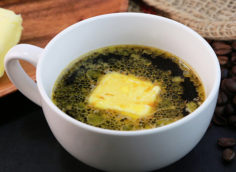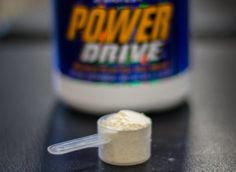Most newspaper movie reviewers and restaurant critics use the "star" system to evaluate the merits of whatever film or eatery they're critiquing. This system is so widely used that practically any member of Western society automatically knows that a "4-star" restaurant is serving up some pretty good eats, or that a 4-star movie is probably going to make boffo box office.
Conversely, a 1-star restaurant is most likely to be found along the highway with EAT spelled out in 10-foot high letters; a 1-star movie is likely something that started as a Saturday Night Live skit and found its way to DVD format in about a week.
However, the "star" system is a little too conventional for us here at TNation. It lacks, shall we say, a certain testicularity. We need a rating system with a little more oomph and a lot more balls.
Enter the nutsack rating.
What I'm going to do, from time to time, is to evaluate various nutritional supplements, chemicals, ingredients, foods, or practices. As you might have guessed, a 1-nutsack rating conveys lameness whereas a 4-nutsack rating conveys both quality and ballsiness (remember, each nutsack, with few exceptions, contains TWO balls–that's double the quality!).
Let's see what's at the bottom of our gym bag this month.
It's Udderly Disasterous!
Hormones! Hormones! There's Growth Hormone in our milk and dairy products! Our children our growing enormous breasts, which wouldn't be so bad in itself but they're only five years old and dag nab it, it's a little unsettling when they wear those Underoos push-up bras!
What iz we gonna do!?!
Phooey.
Yes, some segments of the dairy industry use bovine growth hormone to increase milk production. Does it get into our food?
It seems so.
HOWEVER, grok this, granola cruncher: growth hormones are peptide-based hormones, which means that they're constructed of amino acids which, as you know, are the building blocks of proteins.
What happens when you ingest proteins? That's right, you digest them. The enzymes in your stomach cleave the proteins into their constituent amino acids, where they're chemically indistinguishable from the other amino acids that are there courtesy of the 5-pound Krusty Burger you just ate before you washed it down with some milk.
Furthermore, even if bovine growth hormone did survive the digestive process, it wouldn't have any growth promoting effects on you unless your mom was a cow. Bovine growth hormone is not human growth hormone.
This brings to mind another hormone scare, or should I say, scam. You know how some of the chicken you buy boasts "Hormone free" on the label? Well, the FDA has long prohibited the use of hormones of any kind in poultry (and pigs, too). Even the cheapest, crappiest, salmonella-est chicken out there is hormone-free.
So what do you do if you're an unscrupulous poultry farmer? You slap a "Hormone Free!" label on your product so that buyers will assume you're the only one practicing such noble and health conscious poultry practices.
Sheesh.
By the way, you know those "Boo-Berries" that Count Chocula says are in his cereal? There's no such thing. Total scam.
I'm giving the Great Hormone Scare a 1 instead of 0 because all things considered, I'd rather everyone in the industry went totally granola. In an ideal world, it'd be nice to have all our livestock raised on organic honey and golden wheat while listening to Enya instead of being given any growth-promoting substances.
It's probably not going to happen, but it's a nice thought.
Nutsack Rating for The Great Hormone Scare:
"I'll Take Four Dozen, Along with a Blue-Ray Copy of "Throbbin' Hood, Prince of Beaves."
Okay, AccessRx isn't a nutritional product; it's an Internet-based company that doesn't' sell anything remotely related to nutrition. Instead, they sell pharmaceuticals ranging from erectile dysfunction drugs like Viagra and Cialis to prescription antacids like Nexium.
(And no, they don't sell steroids or any of the "good stuff.")
What's different about them is that you can order certain drugs and bypass your physician, flipping him the unseen finger as you log onto the AccessRx website.
I took the company out for a test run a couple of weeks ago by attempting to order some of the erectile dysfunction drug Levitra.
Let me quickly add that I don't have erectile dysfunction. I was, however, anticipating a marathon bout of sex for the upcoming weekend (it was kind of a sex-version of a walkathon, with sponsors offering a certain amount of money per sexual act and the proceeds going to charity) and thought I could use a little pharmaceutical help.
Anyhow, I simply created an account and filled out a medical questionnaire. I then placed an order for 3 Levitra pills and gave them a credit card number.
At the completion of the order, I was told that the company would call me to verify the order. I also had the choice of calling the company myself to expedite things. I chose the latter.
After speaking to a representative who went over the order, I was told that I would need to speak to an on-staff physician. I was put on hold for approximately 3 minutes before a female doctor took my call.
She asked me if I had any heart problems. I answered "absolutely not." She then asked if my physician knew I was going to be ordering this drug. I said yes, even thought that wasn't exactly true.
She said, "Great, your order will be sent out today and you'll have it in two days."
And sure enough, the Fed-Ex package arrived in two days.
Sweet.
While I'd give AccessRx 4 stars for ease of transaction and quality of service and sheer renegade ballsiness for selling and sending certain prescription drugs trough the mail, I'm giving them an official "3" on the nutsack rating simply because I haven't completely reconciled the widsom of providing prescription drugs without a face-to-face physician/patient interaction.
Nutsack Rating for AccessRx:


Is Schizandrol A the Schiznitz or Just Sh..?
Schizandrol A is one of the main active ingredients in a popular supplement on another bodybuilding site that's been coined the "Wal-Mart" of the supplement world.
The substance, extracted from the dried Schizandra fruit found in China and Korea, is purported by the manufacturer of said supplement to "provide a stimulating effect to the body and mind."
In addition, their ad copy purports that the Schizandrol A "compound has been suggested to possibly lower levels of hormones like cortisol in animal models."
The supplement combines Schizandrol A with other stimulatory and endurance enhancing compounds like caffeine and creatine, among others, to purportedly give you "crazy lasting energy, along with sick muscle-engorging pumps."
The pharmaceutical supply company in Shanghai that sells Schizandrol A to the world alleges the product "outperforms amphetamine in cognitive tasks" and "increases the work capacity of muscles by 222%," among other impressive effects.
They also claim the supplement lowers cortisol.
All of this presents a puzzle. According to traditional Chinese medicine, Schizandrol A is an adaptogen, which by definition means that it improves mental and physical performance.
There are no known studies in the Western literature to confirm or disprove this, but the main study in Chinese literature using Western protocols found that the stuff did anything but stimulate the nervous system.
In fact, ironically, a scholarly paper titled "Effects of Schizandrol A on the Central Nervous System" reported that the compound has antagonistic effects on the stimulating effects of amphetamine, along with inhibiting the effects of caffeine, which is one of the other ingredients in the energy stimulating product.
That means that the makers of this energy product might have actually inadvertently combined downers and uppers where each appears to cancel out the effects of the other!
It's like taking a bennie with a valium.
And yes, it's true that it might reduce cortisol in animals, as the cited study on mice supports, but that may well be because of its inhibiting effects on the central nervous system. That's right, it decreases spontaneous motor activity in those same mice, along with potentiating the effects of pentobarbital or barbital.
When given to rats in higher doses, it actually caused catalepsy. The rats were pretty much frozen in position like the caveman occasionally found in blocks of ice.
And it seems that if Schizandrol A lowered cortisol, it did it because it virtually puts the user to lullaby land, which by most accounts is a very stress-free place to be.
All that being said, there are anecdotal reports that the product that contains Schizandrol A appears to work. Is it because of the Schizandrol A? I doubt it. It should be noted, though, that some athletes reported on the web that they tested positive for amphetamine after using the product, which might go a long way in explaining why the product might give users a charge.
It also brings into question (yet again) the integrity of the Chinese manufacturing system. In a recent study of herbal weight loss products conducted in Hong Kong, researchers found two or more pharmaceutical agents in 61 of the supplements they tested!
It doesn't exactly give you confidence in Chinese herbal products of any kind.
Schizadrol A gets 2 nutsacks because it may well prove to have some worth in lowering cortisol, but probably not as a blow-your-head-off stimulant.
Nutsack Rating for Schizandrol:

The Good Omega-6 Fatty Acid
Most long-time readers of TNation know all about the fatty acid problem. They know that due to a host of reasons, mostly economical, modern food production has swung–wrenched, more accurately–the fatty acid pendulum way to the omega-6 side, leaving the poor old omega-3s feeling lonely and neglected.
Just in case anyone in America has forgotten, omega 3s are the fatty acids most famously found in fish and omega-6s are the kind found in most heavily processed foods, including modern beef and poultry and even non-wild fish.
The result of this pendulum swing is thought to have caused or contributed to a good deal of the modern day medical scourges that plague us, from cardiac disease to obesity to cancer.
As a result, omega 6s have been labeled "bad," and they're not even allowed into some of the classier nightclubs anymore.
As you probably know, terms like "good" and "bad," when applied to fatty acids, have a lot do with quantity and ratios and the like. However, there is at least one omega-6 fatty acid that's in short supply and that can almost unanimously be awarded the coveted "good" title. It's called Gamma Linoleic Acid, or GLA.

GLA, in the form of borage oil or primrose oil, was a standby in the supplement cabinets of almost every quality bodybuilder in the 90's but it wasn't snazzy, so it faded from the pages of the bodybuilding mags and resultantly, its space in kitchen cupboards was taken up by more glamorous supplements that were often, in comparison, poseurs.
That's too bad because virtually everyone could stand to supplement their diet with GLA as deficiencies are incredibly common, along with the enzyme governing its metabolism becoming less active with age.
Doing justice to GLA's potential effects would take tens of thousands of words, so allow me to instead present a truncated bullet chart of some of its benefits:
- Stimulates the metabolism through activation of brown fat.
- Fights excess estrogen.
- Improves skin quality.
- Improves cholesterol levels.
- Combats asthma, diabetes, arthritis, and possibly even cancer.
- Inhibits arachidonic acid from converting into detrimental inflammatory molecules.
Most studies on GLA that showed significant benefits used anywhere from 800 to 1500 mg. per day. It's time to welcome GLA back into the home of the elite bodybuilder, strength athlete, or average Joe who gives a damn about his health and performance.
Nutsack Rating for GLA:



That's all I've got this time. May your nutsack be bountiful and never flap loosely in the wind.




